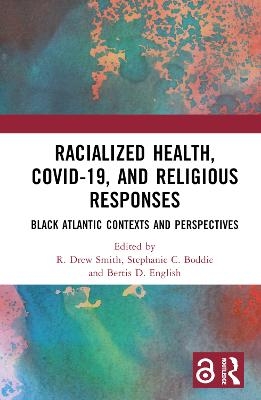
Racialized Health, COVID-19, and Religious Responses
Routledge (Verlag)
978-1-032-10223-8 (ISBN)
Systemic and Socio-Cultural Dimensions of Black Health
Ecclesial Responses to Black Health Vulnerabilities
Public Education and Policy Considerations
Spirituality and the Wellness of Black Minds, Bodies and Souls
Part I explores ways social and cultural factors such as racial bias, religious conviction, and resource capacity have influenced and delimited black health prospects. Part II looks historically and contemporarily at denominational and ecumenical responses to collective black health emergencies in places such as Nigeria, the UK, the US, and the Caribbean. Part III focuses on public advocacy, particularly collective black health, both in terms of policy and education. The final section deals with spiritual, psychological, and theological dimensions, understandings, and pursuits of black health and wholeness.
Collectively, the essays in the volume delineate analysis and action that wrestle with the multidimensional nature of black wellness and with ways broad public resources and black religious resources should be mobilized and leveraged to ensure collective black wellness.
"The Open Access version of this book, available at www.taylorfrancis.com, has been made available under a Creative Commons Attribution-Non Commercial-No Derivatives 4.0 license."
R. Drew Smith, PhD, is a political scientist who serves as professor of Urban Ministry and director of the Metro-Urban Institute at the Pittsburgh Theological Seminary. He is a founding co-convener of the Transatlantic Roundtable on Religion and Race, a global network of scholars, religious leaders, and activists. His publications on religion and public life include more than eighty articles, chapters, and essays, nine edited books, and four themed academic journal issues. He also holds an appointment as Professor Extraordinarious at the Institute for Gender Studies at the University of South Africa. Stephanie C. Boddie, PhD, is an assistant professor in the Diana R. Garland School of Social Work, the George W. Truett Theological Seminary, and the School of Education at Baylor University where she co-teaches Disrupting Racial Disparities in Health Care. She also is a co-convener of the Transatlantic Roundtable on Religion and Race, a professor extraordinarius in the Institute for Gender Studies at University of South Africa, a faculty associate at the Center for Social Development at Washington University and a fellow at the University of Pennsylvania’s Program for Research on Religion and Urban Civil Society. She is coauthor of more than sixty journal articles, chapters, and reports, and of several books and short films. Bertis D. English, PhD, is a professor of history at Alabama State University in Montgomery. He is owner of English Editing Services, LLC; author of the book Civil Wars, Civil Beings in Civil Rights in Alabama’s Black Belt: A History of Perry County; and editor of the International Journal of Africana Studies. His scholarly writings appear in state, regional, national, and global publications.
Introduction: Black Health, Church Responsiveness, and Transnational Metrics; I. Systemic and Sociocultural Dimensions of Black Health; 1. Racializing Religious Institutions during the COVID-19 Pandemic; 2. Racialized Discourses on Disease at Intersections of Canadian and the Caribbean Contexts; 3. Racialized Health Care Inequities Dating to Slavery; 4. Cuban Public Health Care, Economic Scarcity, and COVID Management; 5. Black Health, Ethics, and Global Ecology; 6. Food Insecurity, Black Churches, and Black Household Vulnerabilities during COVID-19; 7. Setswana Medicinal Practices and Tensions with Western Health Care Perspectives; 8. Racism and Clinical Trials of COVID-19, Tetanus, and Malaria Vaccines in Kenya; II. Ecclesial Responses to Black Health Vulnerabilities; 9. The African Methodist Episcopal Church and Its Reckonings with Deadly Plagues, 1793 to 2020; 10. Pandemics, the Rev. Francis J. Grimkeì, and Life Lessons; 11. Collins Chapel Hospital and the Christian Methodist Episcopal Church Responses to Health Care Disparities in Memphis, Tennessee; 12. Black United Methodist Church Responses to COVID-19; 13. Redeemed Christian Church of God’s Responses to Contemporary Health Urgencies in Nigeria; 14. The Church of God in Christ, COVID-19, and Black Pentecostal Constructive Engagement; 15. Richard Allen, Black Aid Workers, and Civil Rights Lessons of the First Great Epidemic in the United States; 16. Caribbean Churches, Capacities, and Responses to the COVID-19 Pandemic; 17. Black Majority Church Responses to Black Health Urgencies in the United Kingdom; 18. COVID-19, Cultural Competency, and Church Responsiveness in Nigeria; III. Public Education and Policy Considerations; 19. The Black Church, Public Policy, and the Challenge of Health Equity; 20. Black Mental Health Challenges and Responses by Britain’s Black Majority Churches; 21. Cultural and Religious Influences on Genetic Interventions in Sub-Saharan Africa; 22. Pastoral Care, the COVID-19 Pandemic, and Oppression in Port-au-Prince, Haiti; 23. Black Women’s Reproductive Health, Justice, and COVID Complications in the United States; 24. Film as a Pedagogical Tool for Trauma- and Resiliency-Informed Theology and Liturgy; 25. Shifting the Tide Toward Health Equity; IV. Spirituality and the Wellness of Black Minds, Bodies, and Souls; 26. Nigerian Women, Mental and Physical Health, COVID-19, and Spirituality; 27. African American Palliative Care amid the COVID-19 Pandemic; 28. Black Religion, Mental Health, and the Threat of Hopelessness during the COVID-19 Pandemic
| Erscheinungsdatum | 14.03.2022 |
|---|---|
| Zusatzinfo | 3 Tables, black and white |
| Verlagsort | London |
| Sprache | englisch |
| Maße | 156 x 234 mm |
| Gewicht | 453 g |
| Themenwelt | Sachbuch/Ratgeber ► Gesundheit / Leben / Psychologie |
| Religion / Theologie ► Christentum ► Kirchengeschichte | |
| ISBN-10 | 1-032-10223-3 / 1032102233 |
| ISBN-13 | 978-1-032-10223-8 / 9781032102238 |
| Zustand | Neuware |
| Haben Sie eine Frage zum Produkt? |
aus dem Bereich


